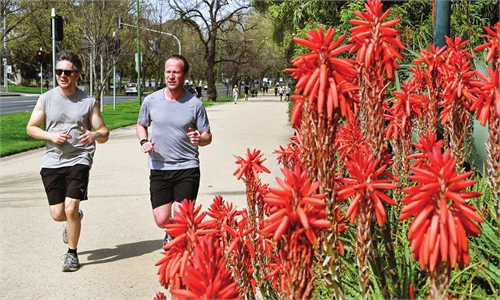Scientists discover Australia’s oldest eagle fossil in South Outback

Photo taken on Sept. 2, 2021 shows cherry blossoms by Lake Burley Griffin in Canberra, Australia. Australia reported another record number of 1,477 new cases on Thursday morning as the country continued to battle the third wave of COVID-19 infections. Photo: Xinhua
Scientists have identified an eagle fossil discovered in the South Australian Outback as one of the world's oldest raptor species.
In a study published on Tuesday, a team of paleontologists from Flinders University revealed that an eagle fossil found in 2016 is a new species that dates back 25 million years to the late Oligocene.
Ellan Mather, lead author of the report, said the new species, named Archaehierax sylvestris, had a footspan of 15 centimeters.
"This species was slightly smaller and leaner than the wedge-tailed eagle, but it's the largest eagle known from this time period in Australia," she wrote.
"The foot span was nearly 15 centimeters long, which would have allowed it to grasp large prey. The largest marsupial predators at the time were about the size of a small dog or large cat, so Archaehierax was certainly ruling the roost," she added.
The fossil was found on the shore of a dry lake known as Lake Pinpa on a remote outback cattle station.
More than 60 bones were recovered, making it one of the best-preserved fossils ever found at Lake Pinpa.
Mather said it was likely that the eagle was washed into the lake after it died and its bones were buried in sediment.
The area was heavily forested during the Oligocene, which ended approximately 23 million years ago.
"The fossil bones reveal that the wings of Archaehierax were short for its size, much like species of forest-dwelling eagles today. Its legs, in contrast, were relatively long and would have given it considerable reach," Mather said.
"The combination of these traits suggests that Archaehierax was an agile but not particularly fast flier and was most likely an ambush hunter. It was one of the top terrestrial predators of the late Oligocene, swooping upon birds and mammals that lived at the time."
Xinhua



